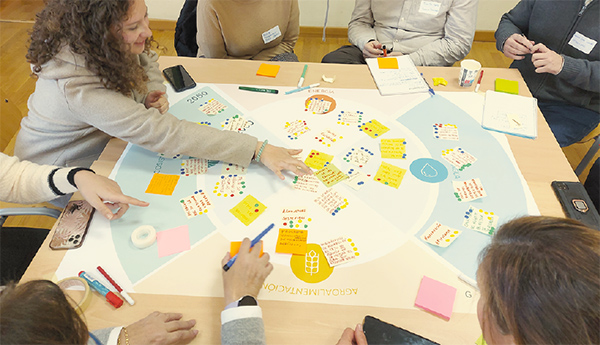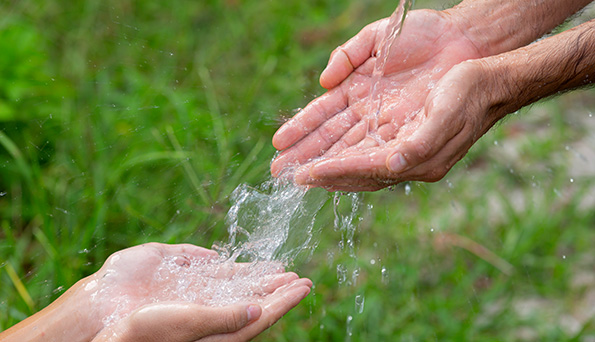GoNEXUS: water as part of the integrated solution
The GoNEXUS project, funded by the European Union Horizon Programme, places water as one of the cross-cutting aspects of its case studies, together with energy, food and ecosystems. ETSIAAB professor María Blanco is part of GoNEXUS project, leading the UPM team.
March 2023
Every year since 1993, World Water Day has been held on 22 March. This day raises awareness and inspires action to tackle the water and sanitation crisis since 2000 million people worldwide lack safe drinking water. Back in 2015, the United Nations Conference dedicated one of the Sustainable Development Goals (SDG6 Clean Water and Sanitation) because of the importance of this natural resource. GoNEXUS also gives water the priority it deserves. It is a 4-year project, EU Horizon 2020 (H2020), funded by the European Union Horizon Programme call, H2020-LC-CLA-2018-2019-2020, and based on cross-cutting and joint research. Intending to ensure the environmental security of our planet, the researchers of this project analyse river basins in Europe and Africa, focusing on the governance of four interrelated elements: water, energy, food and ecosystems (WEFE). From a nexus and interrelationship perspective, we aim to face our planet's socio-economic and environmental challenges in the coming years. Regarding water, GoNEXUS defines the impacts of climate change and drought on the availability and management of water resources globally and locally. But it cannot be analysed in just one way. For example, addressing water scarcity requires attention to impacts on energy demand, food security and ecosystem conservation.
Currently, the GoNEXUS project is developing eight in-depth case studies. On the one hand, six studies are based on river basins in Africa and Europe (the Senegal and Zambezi river basins in Africa; the Danube river basin and Lake Como basin in Europe; and the Jucar river basins and the Tagus-Segura water transfer within Spain). On the other, two cases address global and EU issues. Researchers will carefully monitor river basins taking into account stakeholders to apply the knowledge analysed and collected to coming scenarios, tools and solutions.

One of the most significant projects is led by María Blanco, a professor in Department of Economics of Agriculture, Statistics and Business Management at ETSIAAB. In addition, she is also involved in the cases of the Danube river basin (a great interest case due to its large surface area in Europe) and the Spanish cases of the Jucar river and the Tagus-Segura water transfer.
UPM team
The UPM team led by professor María Blanco is made up of six other members:
Two researchers. Two internship students from New York and France, thanks to the agreements signed between the CEIGRAM (Research Centre for the Management of Agricultural and Environmental Risks) and the universities of the students. Finally, two ETSIAAB students working on their Master's Thesis in this area.
María Blanco is also part of the AgroEcoS research group based on agro-economics, agri-food and agro-ecosystems. Therefore, she says, "it is essential to involve students in research so that they know what we professors are doing".
The nexus between water, energy, food and ecosystems is a topic that "is already very complex in itself," she says, as these areas are very complementary. If only one-issue policies are implemented, "there may be disagreeing objectives", regrets María Blanco. Although a lot of research has been done in the last decade, there was one more action to be taken: moving from theory to practice. As the professor says, "In the end, it has much to do with governance and policies undertaken by different Ministries, General Directorates ". The true challenge, she says, is "to get all these policies coordinated". To achieve this ambitious goal and guarantee that the policies studied are implemented, "we must reach the political decision-makers".

Dialogue for agreement
To achieve agreement, this team focuses on stakeholder dialogues. These meetings involve bodies at all levels; General Directorates, and professional associations, at the European level; regional and local organisations; and civil society. This happens because the importance of the case studies is also further: "We have case studies both at the local level (as is the case dealing with the Tagus basin) and at the European level". Therefore, it is a very different space where various actors (experts, politicians and other stakeholders) from different areas partake. Still, it is crucial to know their opinion and collect their ideas. "These meetings try to show that there may be many disagreeing goals, so we must try to reach for agreement," says María Blanco.
This is how GoNexus brings cross-cutting concerns to the table: first, identify the needs, and then propose solutions. Once the challenges have been recognised, they are analysed with the team's working models. Then the results are discussed again so the actors can see what is or is not viable. In the words of María Blanco: "There must be feedback all the time". The major complication of the results measurement phase is that some of these indicators must be quantitative (and not only qualitative) since, as the professor says, "they must measure aspects that discern to what extent something is achievable or ideal in practice". And this is what these dialogues aim to do: make it clear what is desired and what is capable of becoming real.

Political decisions based on information
With data collected in the case studies, GoNEXUS jointly develops a specialised sustainability assessment framework (SAF). The aim is co-designing and evaluate integrated and coordinated management and governance measures. In other words, "all the results and indicators resulting from both models and dialogues are integrated to analyse coherently," says María Blanco. In short, they want to achieve "a sort of ranking" of what can be done and get "more information in political decisions".
The university is worth highlighting as the setting where these dialogues are held. In María Blanco's view, one of the causes that make these meetings so profitable is that they occur in a "more objective setting". In addition, the research and academic character of the university makes it "a place where you can talk calmly since there is less pressure than in other settings such as a ministry", she says.
As a "costly and effort-intensive" project, analysing all the information gathered from these dialogues is hard. Besides, it involves a notable investment of time for the researchers and the stakeholders of the process. However, according to her view: "I think this is the way forward: involve people from the start and learn from everyone".
GoNEXUS project's data from the case studies will help to create future scenarios of global impact that will impact the entire planet in the coming decades: migratory pressure, food price crises, water shortages, inadequate irrigation or energy market imbalances. The main objective is that the solutions to these problems are based on more outstanding commitment and coordination in the measures to be adopted by administrations. All this pursues innovative solutions through harmonised, efficient and sustainable governance, a considerable objective for its importance and ambition.

